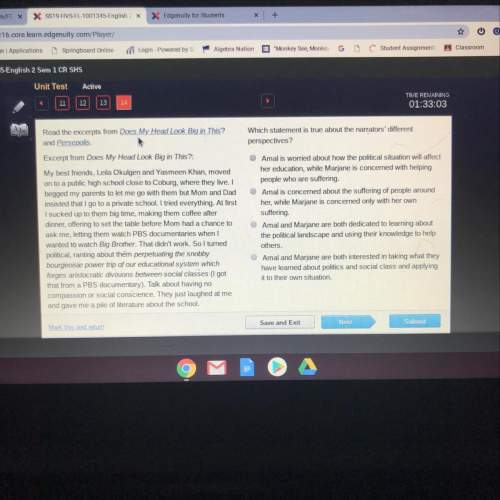
English, 30.07.2019 00:30 genyjoannerubiera
Which of the following quotations provides evidence that the man is becoming more frightened? a. "the man was shocked. it was as though he had just heard his own sentence of death. for a moment he sat and stared at the spot where the fire had been. then he grew very calm. " b. "fifty degrees below zero meant eighty-odd degrees of frost. such fact impressed him as being cold and uncomfortable, and that was all. " c. "he was used to the lack of sun. it had been days since he had seen the sun, and he knew that a few more days must pass before that cheerful orb, due south, would just peep above the sky-line and dip immediately from view. " d. "and the man, as he beat and threshed with his arms and hands, felt a great surge of envy as he regarded the creature that was warm and secure in its natural covering. "

Answers: 1


Another question on English

English, 21.06.2019 16:00
How do you think langley employees reconcile the difference between the work they do that is innovative and advances humankind with the work they do that destroys it?
Answers: 1

English, 21.06.2019 23:00
Which two lines in this excerpt from elizabeth bishops the fish suggests that the speaker respects the fish
Answers: 3

English, 21.06.2019 23:30
The bus driver who, only works weekdays, always waits for me when i'm running latecorrect the comma sandwich
Answers: 1

English, 22.06.2019 04:50
Read the passage, then answer the question that follows. no one could have seen it at the time, but the invention of beet sugar was not just a challenge to cane. it was a hint—just a glimpse, like a twist that comes about two thirds of the way through a movie—that the end of the age of sugar was in sight. for beet sugar showed that in order to create that perfect sweetness you did not need slaves, you did not need plantations, in fact you did not even need cane. beet sugar was a foreshadowing of what we have today: the age of science, in which sweetness is a product of chemistry, not whips. in 1854 only 11 percent of world sugar production came from beets. by 1899 the percentage had risen to about 65 percent. and beet sugar was just the first challenge to cane. by 1879 chemists discovered saccharine—a laboratory-created substance that is several hundred times sweeter than natural sugar. today the sweeteners used in the foods you eat may come from corn (high-fructose corn syrup), from fruit (fructose), or directly from the lab (for example, aspartame, invented in 1965, or sucralose—splenda—created in 1976). brazil is the land that imported more africans than any other to work on sugar plantations, and in brazil the soil is still perfect for sugar. cane grows in brazil today, but not always for sugar. instead, cane is often used to create ethanol, much as corn farmers in america now convert their harvest into fuel. –sugar changed the world, marc aronson and marina budhos how does this passage support the claim that sugar was tied to the struggle for freedom? it shows that the invention of beet sugar created competition for cane sugar. it shows that technology had a role in changing how we sweeten our foods. it shows that the beet sugar trade provided jobs for formerly enslaved workers. it shows that sweeteners did not need to be the product of sugar plantations and slavery.
Answers: 1
You know the right answer?
Which of the following quotations provides evidence that the man is becoming more frightened? a. "t...
Questions











Mathematics, 23.10.2019 02:00




Mathematics, 23.10.2019 02:00








